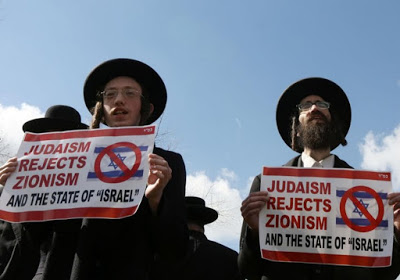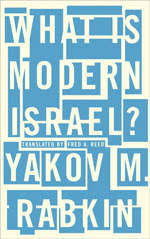Rabkin’s analysis is from an Orthodox religious perspective. Hence he sees the Torah as providing the focus of Jewish identity before the Land of Israel and colonisation took its place. I disagree. What united Jews was what they did and how they did it. It was Jews specific socio-economic role as traders, money lenders, agents of money in a pre-capitalist society based on use values that distinguished them from non-Jews. The religion, the Talmud, reflected their role.
Nonetheless Rabkin has many useful insights and it is a thought provoking essay.
Tony Greenstein
 |
| Holding placards stating “Judaism rejects Zionism and the State of Israel,” “Bibi’s on a world tour to fuel antisemitism,” and “The Jewish religion forbids the existence of the State of Israel,” dozens of radical haredim gathered in front of the US Consulate-General in Jerusalem on Tuesday to protest against Zionism and Prime Minister Benjamin Netanyahu’s speech before Congress. Caption by JPost, photo by Marc Israel Sellem, March 2015. |
July 26, 2015
the historical Iran Deal in Vienna, achieved after 12 years’ of work
this 14th of July 2015. The only State opposing to this deal is Israel which
talks about how dangerous Iran is for the Zionist State.
about this invention and culture of fear on which Zionism is based. We thank him
a lot for his time.
article about Iran before the deal, when Netanyahu spoke in front of the US-Congress about
the so called “Iranic threat”.´
with which means does Israel try to keep it for ever?
earlier article I outlined the history of that invention. Israel used its allies and
agents to promote it and make it into an international issue. Thus Israel was
able to distract world attention from the Palestinians, and deal with them with
impunity.
“existential threat”. Apparently, the non-existent Iranian bomb has now been
replaced by another “existential threat” – BDS, international peaceful
campaign to apply boycott, divestment and economic sanctions to make Israel
change its policy toward the Palestinians. Some Israelis believe that their
society would implode without these existential threats. Fear is what holds it
together.
which has a big Jewish community?
Jews in Iran, it appears they are doing no worse than other Iranians. There
have been no violence or specific repressive measures reported.
friendship between the Jews and the Muslim peoples in general and Iran in
particular?
rebellion against Judaism. Most Jews opposed it when it emerged in the late
19th century. One must reject antisemitic conspiracy theories and understand
that Jews around the world, whatever their vocal support Israel, have no
influence on Israeli policies. They should not be held responsible for what
Israel is and does. Then one could see that Judaism and Islam are the two
closest religions to each other, that Jews lived a lot better in Islamic than
Christian realms and that many classical works of Judaism are written in
Arabic. Moreover, Jews with their experience of antisemitism in Christian
countries can help Muslim to cope with the growing Islamophobia.
Dr. Schuster, who said the Iranian deal is dangerous for Israel and for the
stability of the whole Middle East?
their Israeli masters. With all due respect to functionaries of Jewish
organizations in Germany, they may be less well informed than their government
that signed the Vienna agreement. This kind of support for Israel is not
innocent. Recently it
was revealed that Jewish organizations were covertly used by the Israeli army
to spread its message during the attack on Gaza in 2014. Obviously, those
Jewish functionaries who agreed to do this expose rank-and-file members of
their organizations to reprisals, including violence. This is particularly
grievous since most Jews, at least in the United States, support the Vienna
agreement with Iran. Moreover, American Jews support it more
than the average Americans.
only strengthens the point I made in my answer to your previous question.
In view of this, one wonders who exactly represent functionaries of Jewish
organizations: Jews in their countries or the State of Israel.
wrong. What can we explain to these people to change their position?
Party. One can expect the Prime Minister’s credibility to remain sterling in
those circles and their media. Elsewhere, he appears a lot less credible. But
at issue is not his personality. Israel’s political mainstream is behind
shift of the Israeli public to
the right. And this leads to Israel’s growing isolation in the world, including
isolation from Jews in major countries.
 |
| Prof. Rabkin, photo from his publisher, Fernwood. |
June 27, 2017
published in English by Pluto: What
Is Modern Israel? by Yakov Rabkin, a professor of history at the
University of Montreal. The central theme of the book is how Zionists have
exploited Judaism and western traditions to offer Israel as a liberal democracy
when it is actually a nationalist colonialists project hanging on by its
paranoid fingernails.
that has brought him to embrace universalist cosmopolitanism when it comes to
interpreting history in our century. Given his background, he has been able to
defy what he calls the “climate of intellectual terror that surrounds the
Question of Israel.”
20 May 2016, Pluto Press, pb, £16.99
provide to a reader is to roll out Rabkin’s deadly insights about the nature of
the “Jewish state,” and the essential antagonism of Judaism and Zionism. What
follows is a long sequence of Rabkin’s observations and findings, all of which
aim to end that climate of terror and allow westerners to speak freely about
the Zionist era.
into a national identity like that of other European nations.”
colonialism,” a policy rejected by both Arab and traditional Jewish
populations.
legitimacy to the renewal of ethnicity as the criterion for belonging
elites of Western nations, in part due to Zionism’s colonialist aims:
colony, which resembles in many ways the United Kingdom’s former colonies
throughout the world, also explains Western support of Israel. Its
self-ascribed identity as a ‘Jewish state’ brings de facto legitimacy to the
renewal of ethnicity as the criterion for belonging.”
contrary to their elites, the majority of the citizens of the Western nations
consider the state of Israel as a threat to world peace.”
meaningful than is Zionism’s hostility to liberalism:
cosmopolitanism and ethnic nationalism. Zionism, meanwhile, is fundamentally
hostile to liberal cosmopolitanism, which explains why the Zionist “left,” in
Israel and elsewhere, has gone largely over to the “right.” What unites the two
camps—their conviction of the legitimacy of Zionism—is more substantial than
the stylistic or tactical differences that divide them.
identity in modernity, and the Jewish aspiration to normal experience among the
nations:
consciously rejected Judaism could preserve, at least for a while, a specific
language (Yiddish), and a few cultural markers. This new identity was
conjugated in a wide range of political options, often of socialist or
nationalist inspiration. By consummating the break with tradition, the concept
of the secular Jew, at variance with the traditional Jewish vision, made it
possible to redefine the Jews as a “normal people” and thus became the cornerstone
of Zionism.
common with traditional definitions of the term. Religious scholars know that:
“the Torah, and only the Torah, makes of the Jews a collective identity.”
Rabbi Samson Raphael Hirsch:
live and to work as patriots wherever He has placed us, to collect all the
physical, material and spiritual forces and all that is noble in Israel to
further the wealth of nations which have given us shelter.
and especially Russia, and it “eliminated the religious—and thus
normative—dimension of Jewish identity and retained only its biological and
cultural dimensions.”
 |
| Prof. Yakov Rabkin, at the Cork conference on international law and the state of Israel, April 2017. Photograph by Tom Suarez |
liberalism: “Zionists consider a liberal, multicultural society as a major
obstacle to the expansion of a Jewish national conscience.”
nationalist intelligentsia] the end of the Jewish people as an autonomous
unit.”
which offers Jews an individual choice but, according to many Zionists, denies
them the opportunity to live a true national life.”
Israelis take up residence in the world’s liberal democracies than citizens of
those countries immigrate to Israel.” That goes for Russian Jews too:
the 20th century, a mere 30,000 made Palestine their destination, and of those,
only a quarter remained there.”
allowed to emigrate, Israel was required to carry out “a full scale diplomatic
campaign in an effort to prevail upon its allies (primarily the United States
and Germany) to limit immigration to their countries of Soviet Jews.”
that emancipation had freed them to penetrate the highest levels of European
society, and found they were rejected, so they sought a nation like other
nations out of this frustration. Torah had been the basis of Jewish unity till
Zionism. But when they went back to the land of Israel, “they would no longer
need to follow [Torah’s] precepts, for their national consciousness, as
experienced in the land of Israel, would be sufficient to sustain that unity.”
they were assimilating into “normal” history:
totally their spiritual heritage and become a ‘normal people.’ The new Israeli
identity appears to facilitate collective assimilation while sparing those who
adopt it the feeling of guilt often linked to assimilation on an individual
basis.”
to the Jews than to the Arabs:
Zionism, the Jews lost their historic identity.”
characterizing the two-tier system of rights for Jews and occupied Palestinians
as “Herrenvolk [master race] democracy.”
with a special destiny] as the exclusive subject of Jewish history led rabbis
to denounce this “cardinal element” of Zionist ideology, Rabkin says. He quotes
Robert Wistrich.
language, study their rich literature, know their history, cherish their faith,
and make the greatest sacrifices for it; they should hope and trust in the
wisdom of divine providence.”
Rabinowitch wrote in 1974. “From the very beginning, it has been the policy to
deliberately incite hatred of the Jew and, then, in feigned horror, point to it
to justify a Jewish state.”
proliferation of antisemitism” – an element of dual loyalty. Rabkin then quotes
a former Israeli diplomat describing the role of Jews in the west as “an
Israel-vassalized diaspora.”
vassalizing of the diaspora goes beyond double allegiance to “a form of
exclusive allegiance to the state of Israel.” (Remember Dennis Ross calling
on U.S. Jews to be “advocates” for Israel, not for Palestinians.) Rakin says:
leaders have dragooned the Jews tends to expose them to criticism, which in
turn justifies Zionism and makes the state of Israel indispensable as an
insurance policy. Even proudly secular Israelis find this policy suicidal for
the future of the diaspora…
feature of Zionist thought and practice. The mobilization of the diaspora to
justify whatever political or military action Israel might undertake
constitutes its critical element.”
activists in Europe never knew the “tolerant variety of nationalism” that arose
in the US and Canada that distinguishes between nation, religion, society and
state. Rather, the two slogans adopted by the Zionist pioneers clearly
illustrated their intentions: “conquest through labour” and hafrada
(separation).
development that remains in force up to the present, and explains in large
measure the perpetuation of the conflict with the Palestinians and the
isolation of the state of Israel in the region.”
“security” has replaced the concept of self-defence that was widely employed
before the creation of the state.
refuge, may well have become the most precarious place of all for the Jews…
Now, in contrast to the early years of Zionism, the sense of victimhood has
become, over the last few decades, an integral part of Israeli Jewish identity.
come to realize that they are actually victims of the Zionist enterprise, which
has subjected them to interminable wars and, in the case of the Arab Jews,
chronic social and economic inferiority.”
curse: “you shall flee though none pursues” (Leviticus).
unstable foundations:
of the hostility of the region’s population as a whole, a hostility often
attributed to so-called “essentialist” causes—Islamic religion and irrational
Jew-hatred—rather than to perfectly understandable social and political ones,
such as the anger generated by discrimination, dispossession, and deportation
of the indigenous population.
“testifies to the fragility of the Israeli state, for all its power and
prosperity, as felt by many Zionists.” While Zionist fears of becoming a
minority cause them to encourage discriminatory immigration policies that only
exacerbate the problem.
national revival. And this too undermines any sense of Israeli permanence.
impression they may make on others, even those who have persecuted them in the
past… But the Zionist education system from its inception has promoted the use
of force, self-affirmation, and combativeness. The Zionists looked upon the
requirement to behave as moral exemplars with scorn and ridicule, caring little
for the impression they, and later their state, make upon the world, and above
all upon its immediate neighbors. Ben-Gurion formulated the proposition thus:
‘What matters is what the Jews do, not what the goyim think.’”
The new Zionist/Israeli culture sees itself as resolutely European. “So it was
that dozens of songs, nursery rhymes, and children’s stories were translated
from Russian into Hebrew during the early years of Zionist settlement.” But not
Arab songs!
Palestine, also recognized that the use of force was a way of tearing the Jews
from Jewish tradition.”
“powerful states that scorn individual morality, practice racial
discrimination, and commit crimes against humanity.” Civic spaces in Israel
have become associated above all with “death for the fatherland,” a linkage
going back to the beginning of Zionist colonization.
guilty of “crimes against the Jewish people,” but of his being a normal
response to an evil bureaucratic system carries “a universal meaning, which
should stand as a warning to any state that adopts ethnic discrimination as
state policy,” Rabkin says.
has undermined the very bases of international public law
force became an article of faith for a large number of Jews. To cast doubt upon
the legitimacy and efficacy of force is, in Zionist circles, tantamount to
treason.”
constant. It reflects the imperative to perpetuate a state established against
the will of the native Arab population and situated predominantly on lands that
had once belonged to that population….Israel’s behaviour, the incarnation of
the principle ‘might makes right’ has undermined the very bases of
international public law conceived to reduce conflict and promote peace.”
as the Jewish National Fund:
Zionist state. In response to an anti discrimination action brought against the
JNF in 2004, the organization confirmed that ‘the loyalty of the JNF is given
to the Jewish people and only to them is the JNF obligated. The JNF, as the
owner of the JNF land, does not have a duty to practice equality towards all
citizens of the state.’”
‘Zionism is indeed the negation of Judaism,’ the words that, for decades, have
been inscribed on the walls of the Haredi quarter of Meah Shearim in Jerusalem
echo this basic position: ‘Judaism and Zionism are diametrically opposed to
each other.’”
has acquired the characteristics of an ideology that produces Jewish racism and
an institutional system that has much in common with South African-style
apartheid.
liberation, has in reality become a skilled manipulator that has attempted to
monopolize control of the land, the water, and the country’s other resources.”
population. An estimated 25 percent of Israeli academics work in the United
States.”
nationalism is perceived as a form of oppression that must give way to the
affirmation of otherness and multiculturalism.”
authoritarian:
questions about certain Israeli policies are sometimes tolerated, not only are
all fundamental critiques of Zionism delegitimized, but likewise any individual
who might have dared to formulate such criticisms in the past. Such people are
systematically excluded from community activities…
assassinate Jacob de Haan [in 1924] above all because he “spoke ill of the
movement to the outside world.”
those who uphold Zionist doctrine, and those who don’t:
fact that for many people allegiance to Israel has long replaced Judaism as the
anchoring principle of Jewish identity. But in the diaspora, this allegiance
extends to an ideal, even imaginary, state rather than to the real and existing
state of Israel, that economic and military power that dominates the region.
Still, there also exists a Jewish identity whose sole content is to criticize
and even to denounce the state of Israel…
Israel into a state of its citizens, and erasing its Jewish nature, is “our
only hope for survival.” Prominent poet and intellectual Yitzhak Laor argues,
“We don’t have to leave this place or give up our lives… we have to get rid of
Zionism.”
a heterogeneous country
dismantled, Rabbi Moshe Sober emphasizes its psychological aspect—and expresses
guarded optimism about its practicality: “A solution is not impossible; it is
not even particularly costly. But it will never be achieved unless we can allow
ourselves to forget for a moment our cherished beliefs for which we have
sacrificed so many lives, and look instead at the actual realities of the
situation. We must stop treating Israel as a romantic dream and learn to see
her as a heterogeneous country in which two fiercely proud ethnic populations
of similar size are struggling for control….”
discussion of the occupation simply conceals another reality, [Sober]
concludes. Israel has in fact become a binational state that denies political
rights to one of those nations.”
its region. Here too he sees racism:
deny Iran the right to acquire similar weapons, arguing that its rulers are
irrational religious fanatics. Clearly the principle of double standards is at
work, reflecting the revival of the concept of so-called civilized countries
that, against empirical evidence, are claimed to possess a monopoly on
rationality in international politics.
It is inherent to Zionism, which is opposed to liberalism.
understanding the contemporary Israel; quite the contrary, they are more likely
to mislead, for Zionism and the state that incarnates it are revolutionary
phenomena. It is easier, in fact, to understand that state’s politics,
structure and laws without reference to either the Jews or their history…. It
is thus imprecise to speak of a “Jewish state” or a “Jewish lobby”: “Zionist
state” and “Zionist lobby” would be more appropriate.
anti-liberal—acceptable to the general public as well as in the media and the
academic world, even in countries with a long liberal tradition where the
state, rather than confessional or “tribal” loyalty, theoretically ensures the
rights of the citizen…. [T]he JNF, which for a century has been establishing
segregated settlements that are out of bounds to Arabs, enjoys not only
Canadian fiscal benefits, but the personal participation of top federal
officials in the organization’s fundraising efforts.
Israeli vassals
this ideology, damaging both U.S. and Israeli notions of citizenship:

